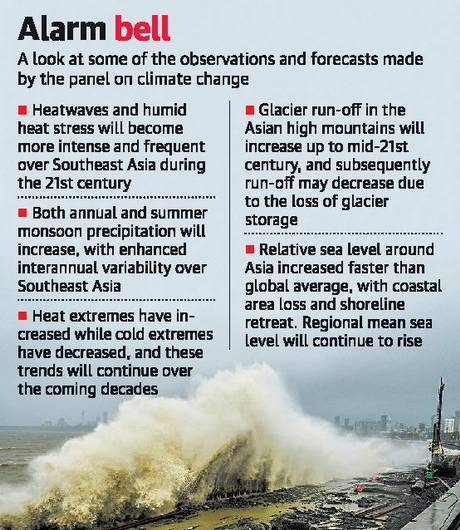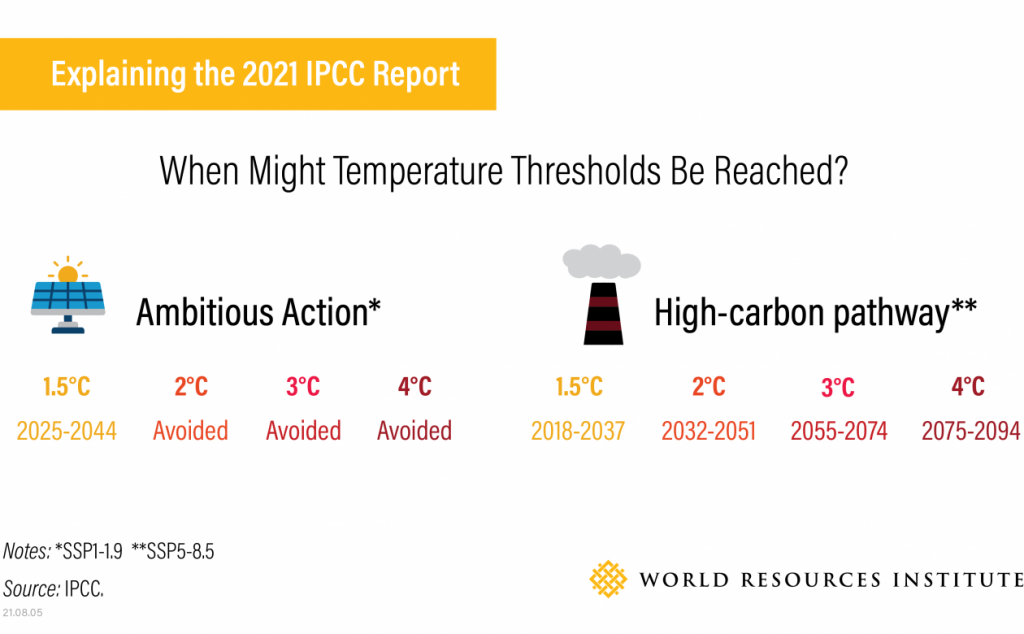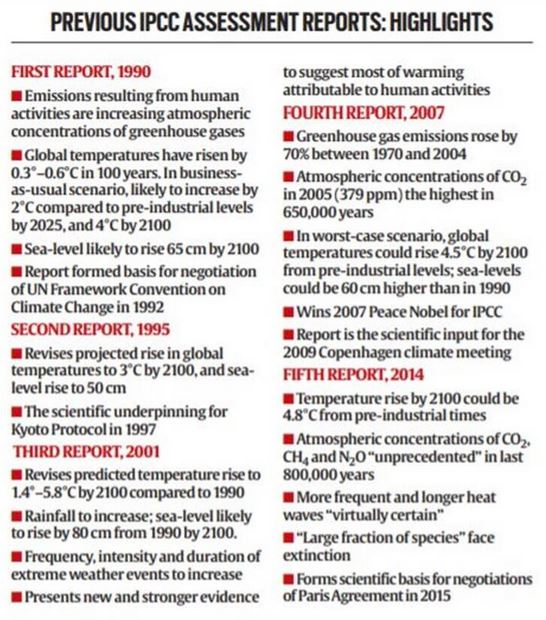IPCC’s Sixth Assessment Report
Why in News ?
- The Intergovernmental Panel on Climate Change (IPCC) has released its Sixth Assessment report titled “Climate Change 2021- The Physical Science Basis”.
Key Findings
- The Indian Ocean is warming at a higher rate than other oceans due to which India will witness increased heat waves and flooding, which will be the irreversible effects of climate change.
- The current overall global warming trends are likely to lead to an increase in annual mean precipitation over India, with more severe rain expected over southern India in the coming decades.
- It noted that carbon dioxide has been and will continue to be the dominant cause of global warming under all greenhouse gas emissions scenarios.
- The warming of the ocean would lead to a rise in sea levels, leading to frequent and severe coastal flooding in low-level areas.
- Monsoon extremes are likely to increase over India and South Asia, while the frequency of short intense rainy days are expected to rise.
- The planet will irrevocably head towards warming by 1.5 degrees Celsius over pre-industrial times in the next two decades stating that human activities are causing climate change.
- Of the 1.1 degrees Celsius of warming since the pre-industrial era, the IPCC finds that less than 0.1 degrees Celsius is due to natural forcings, such as volcanos or variations in the sun.
- Human influence is the principal driver of many changes in snow and ice, oceans, atmosphere and land.
- Eg: Glacial retreat since the 1990s, the reduction of Arctic sea ice since the 1970s, the decline in spring snow cover in the Northern Hemisphere since 1950, and global sea level rise since at least 1970.
- Many consequences of climate change will become irreversible over time, most notably melting ice sheets, rising seas, Biodiversity loss and more acidic oceans and the impacts will continue to mount and compound as emissions increase.
- The report finds carbon sinks such as land and water are at great risk due to increasing temperature.Eg: Amazon Rainforest
- According to IPCC’s study, the land sink eventually turns into a source, emitting CO2 instead of absorbing it . This can lead to runaway warming.
- In short, the new report attributes catastrophic events to sustained global warming, particularly the frequency and intensity of hot extremes, marine heatwaves, heavy precipitation, agricultural and ecological droughts, proportion of intense tropical cyclones, reductions in Arctic Sea ice, snow cover and permafrost.


Region specific impact of Climate Change on Economy
- The IPCC report shows that no region will be left untouched by the impacts of climate change, with enormous human and economic costs that far outweigh the costs of action.
- Southern Africa, the Mediterranean, the Amazon, the western United States and Australia will see increased droughts and fires, which will continue to affect livelihoods, agriculture, water systems and ecosystems.
- Changes in snow, ice and river flooding are projected to impact infrastructure, transport, energy production and tourism in North America, the Arctic, Europe, the Andes and more.
- Storms will likely become more intense over most of North America, Europe and the Mediterranean.
- With a 7,517-km coastline, India would face significant threats from the rising seas and across the port cities of Chennai, Kochi, Kolkata, Mumbai, Surat and Visakhapatnam, 28.6 million people would be exposed to coastal flooding if sea levels rise by 50 cm.
- India’s agriculture and manufacturing sectors will be impacted drastically due to increasing temperature.
India’s Stand on Key Findings of the report
- According to Indian scientists, reaching net zero alone is not enough, as it is the cumulative emissions up to net zero that determine the temperature that is reached.
- It also noted that the GHG warming was assessed to be partially offset by aerosol cooling by almost 30%.
- It stated that cumulative and per capita current emissions are significantly low and far less than its fair share of the global carbon budget.
Way Ahead
- A goal for deep emission cuts should be set by all the countries.
- A Commitment by the countries to strive for achieving net zero emissions that no additional greenhouse gases are emitted by 2050.
- A path towards decarbonising the economy is the need of the hour.
Additional Information
Intergovernmental Panel on Climate Change
-
The Intergovernmental Panel on Climate Change is the United Nations body for assessing the science related to climate change.
- It was created in 1988 by the World Meteorological Organization (WMO) and the United Nations Environment Programme (UNEP).
- Aim: To provide governments at all levels with scientific information that they can use to develop climate policies.
- The IPCC is an organization of governments that are members of the United Nations or WMO currently consisting of 195 members.
- It provides regular assessments of the scientific basis of Climate change, its impacts and future risks and options for adaptation and mitigation.
Previous Findings

References:
- https://www.thehindu.com/todays-paper/global-warming-may-set-off-severe-rain-ipcc/article35828241.ece
- https://www.thehindu.com/news/national/ipcc-report-is-a-clarion-call-to-decarbonise-economies-says-bhupender-yadav/article35827843.ece
- https://www.thehindu.com/opinion/editorial/code-red-on-ipccs-warning-on-climate-points/article35825527.ece
- https://www.hindustantimes.com/environment/climate-change-is-for-real-100-certainty-that-it-is-caused-by-human-activity-101628567959344.html
- https://www.wri.org/insights/ipcc-climate-reporthttps://www.ipcc.ch/about/
Subscribe
Login
0 Comments
